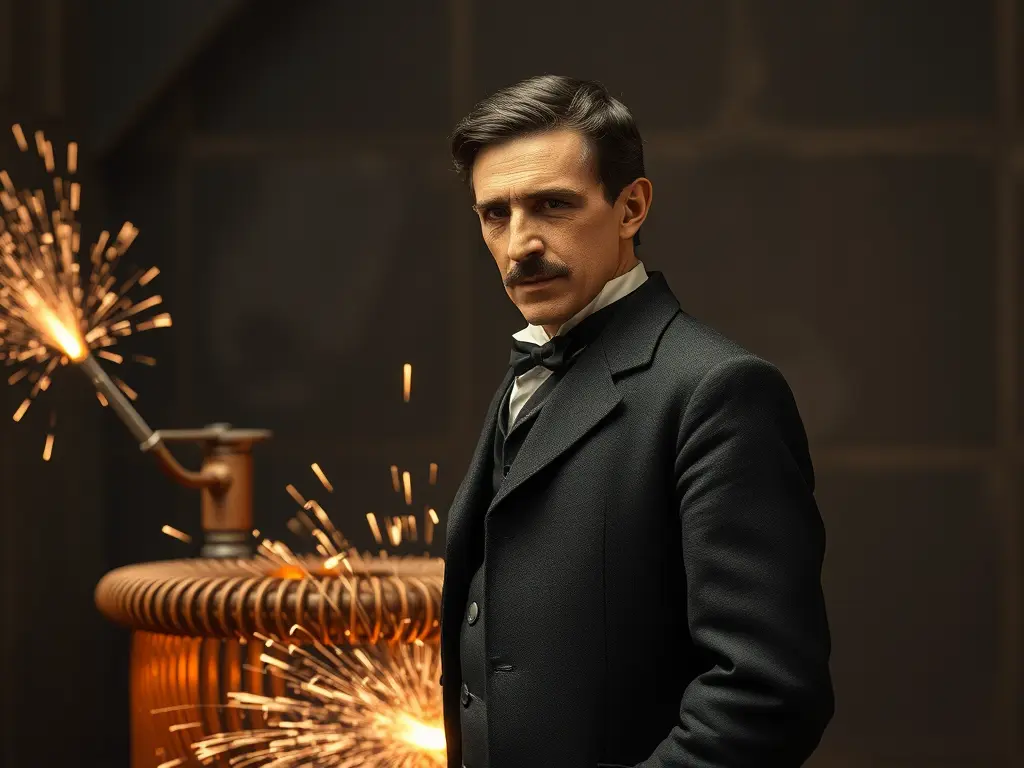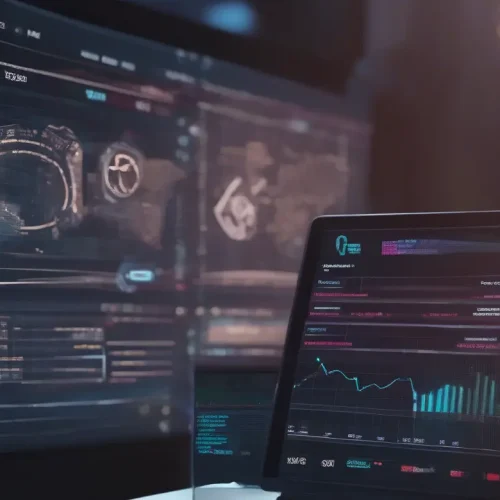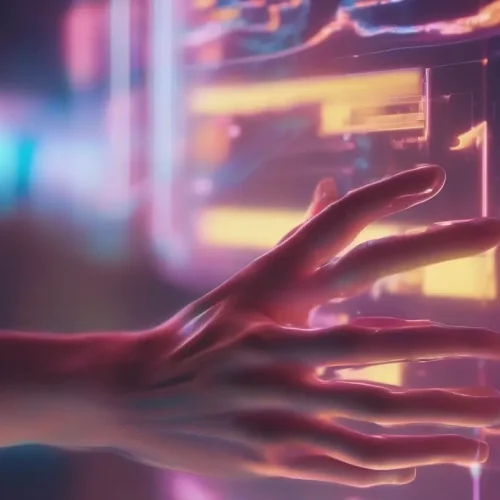Nikola Tesla, A Genius Beyond His Time
Many great names come to mind in science and invention. However, few have a story as tumultuous and controversial as Nikola Tesla’s. Tesla was a Serbian-American scientist and inventor born in 1856 in the Austrian Empire (now Croatia). He studied physics and engineering and showed remarkable genius early on. Tesla was a man of revolutionary ideas. Many key modern technologies owe much to him, including the alternating current (AC) electrical system. This system now forms the basis of power generation and transmission worldwide. Tesla achieved immense success and held over 300 patents in various countries. However, his story also includes many challenges and rivalries. During his lifetime, he lacked proper recognition. This article explores his life and inventions. It also explains why this great genius did not receive his rightful place in the history of science and technology until years after his death.
Early Years and the Shaping of a Creative Mind
Nikola Tesla was born in the village of Smiljan. His father was a Serbian Orthodox priest, and his mother was a talented individual skilled in crafting mechanical tools and devices, significantly influencing young Nikola’s mind. From childhood, Tesla possessed exceptional intelligence and quickly advanced in mathematical calculations and understanding scientific concepts. After completing primary education, he entered the Graz University of Technology in Austria, where he studied electrical engineering. During his studies, Tesla learned about direct current (DC). At that time, Thomas Edison and his companies actively promoted DC. However, Tesla quickly saw its limitations, especially for transmitting electricity over long distances. This sparked his interest in new ideas.
After leaving his studies in Graz, Tesla worked for telegraph companies in Budapest and Paris. In 1884, he emigrated to the United States with big ambitions. He carried a letter of recommendation from one of Edison’s colleagues who called him a “genius.” Tesla soon started working for Edison’s company. But their different views and approaches became clear quickly, leading Tesla to follow a separate path.
The War of Currents: The Confrontation Between Tesla and Edison
One of the most significant chapters in The Story of Nikola Tesla; The Genius History Was Unfair To, relates to the “War of Currents.” Thomas Edison was a strong proponent of the direct current (DC) system and had significant economic interests in it. The DC system was suitable for transmitting power over short distances, but due to significant voltage drop over long distances, it required numerous power plants located close together, which was very costly. On the other hand, Tesla had realized the infinite potential of alternating current (AC). He demonstrated that AC could be easily transmitted at high voltages over long distances using transformers and then stepped down at the destination for domestic and industrial use. This capability made it possible to transmit power over very long distances with significantly less energy loss.
The disagreement between Tesla and Edison over the superiority of AC over DC quickly turned into an intense rivalry. Edison and his associates worked hard to discredit the AC system. They conducted dangerous experiments using alternating current to show it as unsafe. However, Tesla succeeded in realizing his ideas thanks to financial and commercial support from George Westinghouse. Westinghouse, a leading industrialist and inventor, recognized the economic potential of AC. By purchasing the patent rights to Tesla’s inventions, he paved the way for the expansion of this technology.
Tesla’s Revolutionary Inventions: Foundations of the Modern World
Beyond the AC power transmission system, Tesla held hundreds of other patents, many of which form the basis of today’s modern technologies. The Story of Nikola Tesla; The Genius History Was Unfair To, would be incomplete without mentioning these great achievements:
- **Induction Motor:** Tesla invented the AC induction motor, which did not require the problematic commutators and brushes of DC motors. This motor was far more efficient, reliable, and simpler, and quickly became the standard motor in industry. Today, a vast majority of electric motors in household appliances, factories, and vehicles operate based on this principle.
- **Polyphase Systems for Power Transmission:** Tesla developed polyphase systems (such as three-phase) which allowed for the transmission of more electrical power with fewer wires and significantly improved the efficiency of the AC system.
- **Radio and Wireless Technology:** Although Guglielmo Marconi is credited as the inventor of radio and received the Nobel Prize, Tesla’s research and inventions in the field of radio waves and wireless transmission of energy and information began years before Marconi’s work. Tesla conducted extensive experiments in this area and registered key patents. Later, the U.S. Supreme Court upheld Tesla’s patent rights in radio, but this occurred after his death.
- **Tesla Coil:** This iconic invention is a resonant transformer circuit used to produce high voltages, high-frequency currents, and strong electromagnetic fields. The Tesla coil played a central role in many of his experiments, including those related to wireless lighting and wireless energy transmission.
Tesla also worked on ideas that seemed like science fiction at the time, such as wireless energy transmission over large distances, remote control of vehicles, and even energy weapons. Many of these ideas were groundbreaking and indicated a vision far ahead of his time.
Why Was History Unfair to Tesla?
Considering the volume and importance of Tesla’s inventions, the question arises as to why he was not adequately recognized during his lifetime and why The Story of Nikola Tesla; The Genius History Was Unfair To, is a narrative of struggle for credit and financial support. Several factors played a role in this:
- Financial and Commercial Difficulties: Tesla was more of an inventor and theoretical scientist than a successful businessman. He was often careless in financial matters and failed to commercialize his inventions effectively. In contrast, rivals like Edison were more skilled in business and marketing.
- Intense Competition: The War of Currents with Edison was a tough battle that drained much of Tesla’s energy and resources. Negative publicity and efforts to discredit the AC system significantly impacted Tesla’s public image.
- Pioneering and Sometimes Eccentric Views: Some of Tesla’s ideas, such as large-scale wireless energy transmission, were so pioneering at the time that they were incomprehensible even to investors. Furthermore, his peculiar personality and certain obsessive-compulsive tendencies sometimes caused people to distance themselves.
- Lack of Consistent Support: Despite Westinghouse’s initial support, Westinghouse’s own financial difficulties at one point led to a renegotiation of Tesla’s contract, which was financially detrimental to Tesla.
- Focus on Research, Not Fame: Tesla was more fascinated by the process of invention and discovery than by acquiring wealth and fame. He often quickly abandoned his ideas to move on to new projects, while others used his work for financial gain.
Tesla’s Legacy and Late Recognition
Although The Story of Nikola Tesla; The Genius History Was Unfair To, ended on a somber note during his lifetime, the impact of his work on the modern world is undeniable. Over time and with technological advancements, the importance of Tesla’s inventions gradually became more apparent. His alternating current system became the foundation of the global power grid, his induction motors are used everywhere, and his research in radio and wireless paved the way for modern communication.
In recent decades, public interest in the life and work of Nikola Tesla has greatly increased. He is no longer just a name in history books but has become a symbol of unconventional genius and a vision far ahead of his time. Companies have been named after him, and his memory is celebrated as one of history’s greatest inventors. This late recognition is, to some extent, compensation for the historical unfairness he faced.
Conclusion: Lessons from the Life of the Forgotten Genius
The Story of Nikola Tesla; The Genius History Was Unfair To, is both an inspiring and a tragic tale. He was a man with great dreams and unparalleled abilities who changed our world forever.
Tesla’s footprint is visible in many parts of our daily lives, from power systems in homes and factories to the foundations of wireless communication. His life shows us that the greatest ideas and inventors often need time to be fully understood and appreciated.
History was unfair to Tesla, likely due to a mix of personal, commercial, and competitive factors. Despite this, his genius and achievements eventually gained recognition. They secured his rightful place among history’s greatest thinkers.
Studying Tesla’s life is fascinating. It also teaches us valuable lessons about innovation, perseverance, and the challenges new ideas face. To better understand Tesla’s impact on the modern world, it is helpful to explore more about his inventions and experiments.






